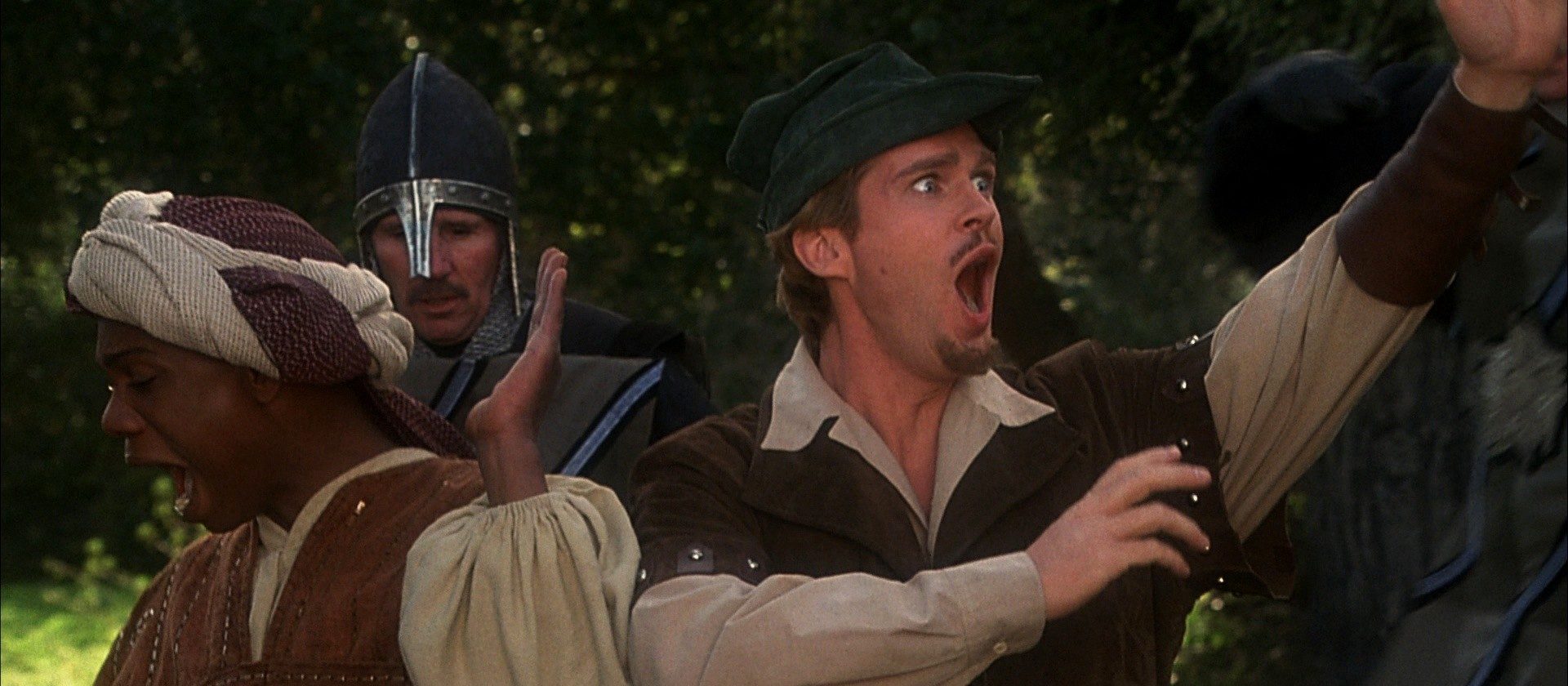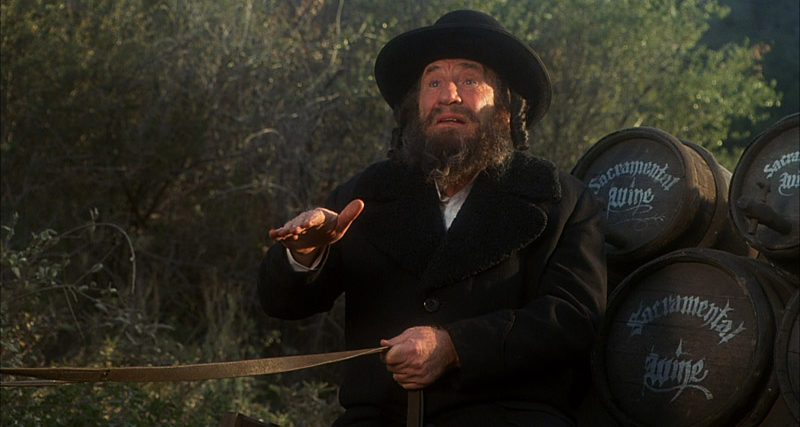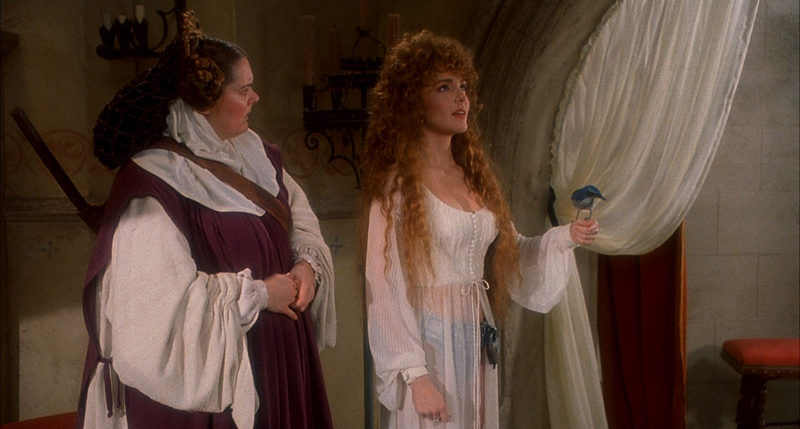

“Oh, Master Robin! You lost your arms in battle! But you grew some nice boobs.”
Sometimes a hearty dose of unsophisticated parody, rambunctious slapstick, and crude humor hits the spot. Such was the case when my wife and I laughed our way through Mel Brooks’ delightful parody of the Robin Hood legend. Even though by this late phase in his career Brooks seems to have been content to coast, his decades of practice ensure that his penultimate effort is eminently watchable and riddled with amusing jokes.
While no brand of humor is off limits for the spoof meister, Men in Tights mostly tilts toward a low brow brand characterized by disconnected puns, one-liners, fourth wall breaks, and visual gags presented in grab bag fashion. It certainly doesn’t stack up against his earlier masterpieces with their relentlessly clever humor, but even in his twilight years Brooks proves capable of running laps around most other comics working in the medium.
Brooks has been incredibly successful with feature-length parodies throughout his career—Frankenstein, Star Wars, Alfred Hitchcock, silent comedies, Westerns, you name it. Anything that was prominent in pop culture entertainment was liable to be put under his scrutinizing gaze and recycled with hilarity. With Men in Tights he takes on the legend of Robin of Loxley, the heroic archer and swordsman who stole from the rich and gave to the poor. It is likely if you’ve not seen Brooks’ film you’re at least passingly familiar with the story. The green clad outlaw has been the subject of ballads and books for hundreds of years, and more recently, radio programs, television shows, comics, video games, board games—and, of course, movies. Robin Hood has been portrayed by numerous actors throughout the years, including Douglas Fairbanks, Errol Flynn, and Sean Connery, among many others. My first exposure to the material came from a VHS copy of Disney’s 1973 animated film. Most crucial to understanding Men in Tights is the proximal release of the Kevin Costner-starring Robin Hood: Prince of Thieves which was the second-highest grossing movie of 1991. Men in Tights is a general spoof of the folklore surrounding the character, and although it explicitly references the Errol Flynn film and the Disney animated adaptation, it is the contemporary mainstream rendition that it most closely resembles.

The story here is old hat, which is why Brooks adeptly skips certain sections of it with the assumption that the cultural saturation of the lore will allow the viewer to follow along just as well. Robin (Cary Elwes) is the charming hero, who, upon returning from the overseas Crusades, finds his community under the tyrannical rule of Prince John (Richard Lewis), who has assumed control of the throne in the absence of his brother, King Richard (a small cameo from Patrick Stewart). After rounding up his cheerful band of Merry Men—his family’s blind servant Blinkin (Mark Blankfield); expatriate Ahchoo (Dave Chappelle), whose father, Asneeze (Isaac Hayes), had asked Robin to look for his son; Will Scarlet O’Hara (Matthew Porretta); and Little John (Eric Allan Kramer); plus a bunch of unnamed dudes who take part in the song-and-dance numbers—Robin takes on Prince John and the Sheriff of Rottingham (Roger Rees) in an attempt to free the people from the harsh rule of the despot and win the hand of the Maid Marian (Amy Yasbeck).

Elwes is great as the titular hero, playing off previous Robin Hood portrayals as well as his own role in The Princess Bride. He astutely tiptoes the fine line between sincere and silly, committing even to the goofiest bits with joy, such as when Robin and Ahchoo bust out some kung fu moves on a gang of robbers. There is none of that caustic ironic distance that comes when an actor thinks a particular scene or line is too lame for them to handle professionally—a testament to Elwes’ dedication but also to the inherent quality of the material. Chappelle handily showcases his comedic chops in his first film role, Lewis and Rees appear to be having a lot of fun hamming it up, and Yasbeck is suitably demure, locked up as she is in her Everlast chastity belt.
But the role players really came to play here, on paper and in person, and it is these asides that really give the film staying power in my estimation. My wife and I got a good bit of mileage out of the shenanigans that stem from Blinkin’s blindness, such as when the Merry Men enter a skirmish and he whittles a tree trunk down to a toothpick by hacking at it with his sword, or when he is posted as a lookout. Brooks himself appears as Rabbi Tuckman (replacing Friar Tuck in the Robin Hood story), a traveling minister who shares his sacramental wine and offers “half-off” circumcisions; Tracy Ullman is Latrine, a snaggle-toothed witch who acts as Prince John’s cook and political advisor and lusts after the Sheriff of Rottingham; Megan Cavanagh is Broomhilde, Marian’s lady-in-waiting; Dick Van Patten plays an abbot; Clement von Franckenstein makes a brief, screeching appearance a royal announcer; and Robert Ridgely plays a giddy hangman. Any of these roles could have been phoned in and drab, or even written out, but they add such vibrant color.
Topping off the cameos is Dom DeLuise’s turn as Don Giovanni that perfectly spoofs The Godfather, referencing everything from Brando playing with the cat, to the cotton balls in his cheeks, to Lenny Montana’s difficulty memorizing his lines. And then right in the middle, simply because he’s already impersonating Marlon Brando, DeLuise shifts his spoof to On the Waterfront. Truly splendid stuff.

Although it’s not quite on the same level, there’s more than a passing resemblance to Monty Python and the Holy Grail and other works by the British troupe, including the musical numbers and a gag involving a bridge. But where some individual jokes may be derivative or underwhelming, Brooks proves adept at pacing his comedy to sustain a feature length film and be consistently funny throughout. There are so many good one-offs here that it’s hard to remember them all (a good problem to have) let alone name favorites, but I’d be remiss not to mention a few, such as Prince John’s mole migrating across his face in between scenes, or Blinken’s use of a “braille” nudie mag, or Ahchoo wearing Reebok Pumps and a snapback while all the other Merry Men where the boots and bycockets appropriate for the era. The numerous fourth wall breaks are also great fun, including a cameraman getting a little excited when filming Marian in a bathtub, Robin Hood stealing a crew member’s donut, Elwes wryly looking at camera out of the corner of his eye, and eventually openly questioning the script when he loses an archery tournament. “I lost. I lost? Wait a second, I’m not supposed to lose. Let me see the script.”
While it may not be a crowning achievement for Mel Brooks, Robin Hood: Men in Tights is one of the best feature length parodies, and, surprisingly, one of the most watchable modern Robin Hood films.